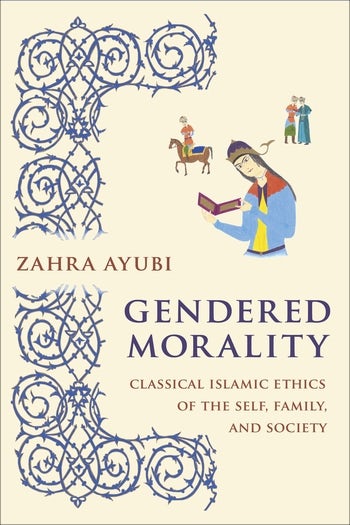Ayubi: Gendered Morality: Masculinity, Marriage, and Social Relations in Premodern Islamic Ethics

Gendered Morality: Masculinity, Marriage, and Social Relations in Premodern Islamic Ethics
Ayubi, Z. M. (2015). Gendered
Morality: Classical Islamic Ethics of the Self, Family, and Society.
(Doctoral degree), University of North Caroline, Chapel Hill.
Ayubi, Z. M. (2019). Gendered
Morality: Classical Islamic Ethics of the Self, Family, and Society. New
York: Columbia University Press.
Analyze gender
constructions as well as moral and religious gender relations
Gender as social
behavior related to sex that reflect religious, cultural, political,
psychological and social understanding of masculinity and feminity pp 2
Gender discourse is
required to fully understand how these text influenced Muslim notions of gender
roles and practices pp 6
Because the
ethicists view women’s nafses as having intellectual defects, they essentialize
women’s roles in two ways. Their first role is as wives, which involves
managing the home so that their husbands can occupy themselves with the lofty
goals of transcendence, and become microcosms of the world. Women’s second role
is being biological vessels for carrying and nourishing children in their early
years. Men of lower social classes provide ancillary support to men of higher
social classes by fulfilling social and economic functions according to their
skills. P.305
Islamic
scriptural sources offer potentially radical notions of equality. Yet medieval
Islamic philosophers chose to establish a hierarchical, male-centered virtue
ethics. In Gendered Morality, Zahra Ayubi rethinks the tradition of
Islamic philosophical ethics from a feminist critical perspective. She calls
for a philosophical turn in the study of gender in Islam based on resources for
gender equality that are unlocked by feminist engagement with the Islamic
ethical tradition.
Developing a lens for a feminist philosophy of Islam,
Ayubi analyzes constructions of masculinity, femininity, and gender relations
in classic works of philosophical ethics. In close readings of foundational
texts by Abu Hamid Muhammad al-Ghazali, Nasir-ad Din Tusi, and Jalal ad-Din
Davani, she interrogates how these thinkers conceive of the ethical human being
as an elite male within a hierarchical cosmology built on the exclusion of
women and nonelites. Yet in the course of prescribing ethical behavior, the
ethicists speak of complex gendered and human relations that contradict their
hierarchies. Their metaphysical premises about the nature of the divine,
humanity, and moral responsibility indicate a potential egalitarian core. Gendered
Morality offers a vital and disruptive new perspective on patriarchal
Islamic ethics and metaphysics, showing the ways in which the philosophical
tradition can support the aims of gender justice and human flourishing.
This dissertation analyzes gender constructions and notions of moral gender
relations in three widely influential medieval Persian treatises of Islamic
ethics (akhlaq), Kimiya-i Sa`adat by Abu Hamid Muhammad al-Ghazali (d. 1111),
Akhlaq-i Nasiri by Nasir-ad Din Tusi (d. 1274), and Akhlaq-i Jalali by Jalal
ad-Din Davani (d. 1502). In examining these prescriptive works that instruct
Muslims on how to live ethical lives, the main question I ask is how have
medieval Muslim ethicists constructed morally guided notions of masculinity,
femininity, and marriage and male homosocial relations. I argue that these
texts reveal a metaphysical tension between an ethical principle that all human
selves (nafses) are created equal and a hierarchical organization of humanity based
on intellect and spirituality, in which some men are above others based on
ethical and rational capacity and all men are above women. The ethicists define
ultimate masculinity in terms of power, intellectual potential, and ethical
comportment in the domestic realm as well as in homosocial structures of court,
civic, and community life. They define women as instrumental to men's ethical
activities since they view women themselves as lacking full rationality and
limited by their biological functions.
- August 2015
- In Copyright
- Ali, Kecia
- Safi, Omid
- Styers, Randall
- Ernst, Carl
- Hammer, Juliane
- Doctor of Philosophy
- University of North Carolina at Chapel Hill Graduate School
- 2015
- Chapel Hill, NC
- There are no restrictions to this item.


Comments
Post a Comment